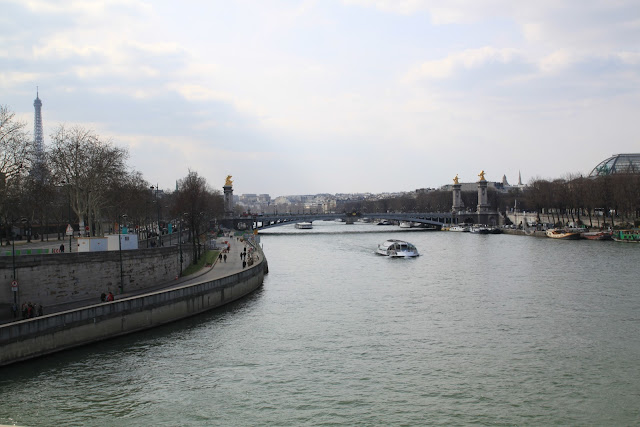Paris is famously divided in two by the Seine, the so-called Left (gauche) and Right (droit) Banks. But is the gauche really gauche? Well, in some places, of course. But mostly the left bank is the charming home of the Latin Quarter, Sorbonne, Jardin de Louxembourg, Eiffel Tower, Invalides/Napoleon's tomb, Musée d'Orsay, and many of the toniest arrondissements in the city (specifically the 6th and 7th). The right bank has the Louvre, Opéra, Grand Palais, Bastille, Marais, Pompidou, and Jardin de Tuileries and some of the trendiest neighborhoods. Many people support one side or the other quite strongly, but I feel I can be pretty neutral on the Right Bank/Left Bank divide, since we don't live on either: Ile Saint Louis and Ile de la Cité are in the middle of the Seine and, therefore, neither here nor there.


Much as I have gone through my life with a mental block confusing oven/stove and dishwasher/washing machine, I have to imagine myself facing west from the tip of Ile de la Cité when I need to remember which is Left Bank, which is Right.
That's Left Bank.........................................................................................................and Right Bank.


If you're wondering, our meaning of gauche as "awkward" or "tacky" is indeed a reference to left-handedness. Yet the word "right" (in both French and English) means correctness or legal rights. The word "sinister" also comes from the Latin word for left. Poor lefties.
But here's the real problem, at least in my anglophone mind, with all this left-and-right: The way to say "go straight" is "tout droit", which literally means "all right". So if you are told to go à droite, you go right, but if you are told to go tout droit, you go straight. I would think if you went all right -- right after right after right, you'd end up right back where you started, but, as Steve Martin once said, "Boy, those French, they have a different word for everything!"
I've been thinking about this a lot, because Pippa is working on left and right in her class and, as you can see, has a way to go to get these concepts down. She has such difficulties -- in both French and English -- that a part of me wonders if it's some genetic legacy from her paternal grandmother, who was naturally left-handed but forced to become a righty and who, consequently, had right-left dyslexia all her life.
One day Pippa comes home from school and tells me her teacher made a boy change hands while working. Though I try not to be the crazy helicopter American parent, I do feel I have to say something, given the results this practice had on my mother-in-law. I am aware that Pippa is not the most accurate source of information, however, so I gently ask before accusing. And a good thing: her teacher is confused, thinks a moment, then says, "Yes! I did make a little boy change hands to use his scissors. Because he's a lefty, and he was using his left-handed scissors in his right hand. Which is actually a little dangerous." When she sees the look of relief on my face, she laughs and said, "Don't worry. Even in France, we don't do that anymore."
Of course the French wouldn't be that sinister. How gauche of me.


Much as I have gone through my life with a mental block confusing oven/stove and dishwasher/washing machine, I have to imagine myself facing west from the tip of Ile de la Cité when I need to remember which is Left Bank, which is Right.
That's Left Bank.........................................................................................................and Right Bank.


If you're wondering, our meaning of gauche as "awkward" or "tacky" is indeed a reference to left-handedness. Yet the word "right" (in both French and English) means correctness or legal rights. The word "sinister" also comes from the Latin word for left. Poor lefties.
But here's the real problem, at least in my anglophone mind, with all this left-and-right: The way to say "go straight" is "tout droit", which literally means "all right". So if you are told to go à droite, you go right, but if you are told to go tout droit, you go straight. I would think if you went all right -- right after right after right, you'd end up right back where you started, but, as Steve Martin once said, "Boy, those French, they have a different word for everything!"
I've been thinking about this a lot, because Pippa is working on left and right in her class and, as you can see, has a way to go to get these concepts down. She has such difficulties -- in both French and English -- that a part of me wonders if it's some genetic legacy from her paternal grandmother, who was naturally left-handed but forced to become a righty and who, consequently, had right-left dyslexia all her life.
One day Pippa comes home from school and tells me her teacher made a boy change hands while working. Though I try not to be the crazy helicopter American parent, I do feel I have to say something, given the results this practice had on my mother-in-law. I am aware that Pippa is not the most accurate source of information, however, so I gently ask before accusing. And a good thing: her teacher is confused, thinks a moment, then says, "Yes! I did make a little boy change hands to use his scissors. Because he's a lefty, and he was using his left-handed scissors in his right hand. Which is actually a little dangerous." When she sees the look of relief on my face, she laughs and said, "Don't worry. Even in France, we don't do that anymore."
Of course the French wouldn't be that sinister. How gauche of me.


No comments:
Post a Comment